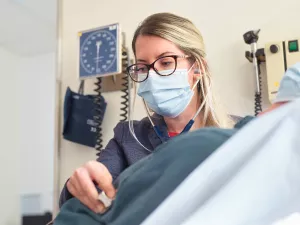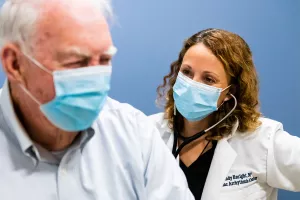Your heart matters to us, and we’re here to take care of it with kindness and the most advanced treatments available. Did you know that almost half of Americans have heart problems? Don’t worry—we’re here to help. Whether you need tips to stay heart healthy or advanced care like heart transplants or minimally invasive procedures, we’re ready to give you the support you need to live your best life.
Advanced cardiovascular care for every heartbeat
Nearly half of all adults in the U.S.—about 121.5 million people—live with some form of cardiovascular disease, like high blood pressure, heart failure or coronary artery disease. While that might sound scary, the good news is that heart disease is often preventable and treatable.
At Tufts Medicine, we’re here to help you care for your heart. Whether you’re managing a heart condition or looking to prevent one, we offer advanced care. Our treatments include drug-coated stents for atherosclerosis and innovative procedures for advanced heart failure, arrhythmias and many other conditions.
In 2023 and 2024, we performed the most heart transplants in New England. We’re proud to be leaders in heart care and research, always looking for new ways to keep your heart healthy.
Each of our hospitals have catheterization labs to diagnose and treat heart and vascular problems close to home. No matter where you are in your health journey, we’re here to help you stay strong and feel your best.

Conditions
We’re here to help no matter your diagnosis. We create personalized treatment plans to fit your needs and goals. Using the latest tools and techniques, we provide care for many heart and vascular conditions, including:
- Angina: Chest pain or discomfort caused by reduced blood flow to the heart. It can be stable (triggered by activity or stress) or unstable (occurring at rest and needing immediate care).
- Aortic disease and aneurysm: Problems with the body’s largest artery, which can grow weaker or bulge (aneurysms) in the chest or abdomen.
- Arrhythmia: Irregular heartbeats caused by mixed-up electrical signals in the heart. These can make the heartbeat too fast, too slow or unevenly.
- Atrial fibrillation (AFib): A type of arrhythmia where the heart beats unevenly or too fast due to faulty electrical signals.
- Cardiac amyloidosis: A condition where abnormal proteins build up in the heart, making it harder to pump blood.
- Cardiac sarcoidosis: A rare immune disease where clumps of white blood cells inflame the heart and affect its electrical system.
- Carotid artery disease: Narrowing of the arteries that carry blood to the brain, increasing the risk of stroke.
- Cardiogenic shock: A serious condition where the heart can’t pump enough blood to meet the body’s needs.
- Congenital heart disease: Heart problems present at birth that affect the chambers, valves or blood vessels.
- Coronary artery disease: Narrowing or blockage of arteries that carry blood to the heart, reducing blood flow.
- Deep vein thrombosis (DVT): Blood clots that form in deep veins, often in the legs, which can lead to serious problems.
- Endocarditis: An infection of the inner lining of the heart, often affecting the valves.
- Heart failure: When the heart can’t pump enough blood to meet the body’s needs, causing fatigue and fluid buildup.
- Hypertrophic cardiomyopathy: A genetic condition where the heart muscle thickens and makes it harder to pump blood.
- Ischemic heart disease: Reduced blood flow to the heart muscle due to blockages, often causing chest pain or heart attacks.
- Pericardial diseases: Inflammation of the sac around the heart that can cause chest pain or affect how the heart works.
- Peripheral artery disease: Narrowed blood vessels in the arms or legs that reduce circulation.
- Pulmonary hypertension: High blood pressure in the arteries of the lungs that strains the heart.
- Valvular and structural heart conditions: Problems with the heart valves, like stenosis or regurgitation, that affect blood flow.
- Vascular disease: Conditions affecting blood vessels, like carotid artery disease, peripheral artery disease and vein problems.
Testing
A healthier heart starts with understanding your unique needs. That’s why we use advanced tools to detect and monitor heart problems. Our testing options include:
- Ambulatory heart monitoring: Devices like Holter monitors track heart activity over 24-48 hours.
- Cardiovascular imaging: Tests like echocardiograms, cardiac CT scans, cardiac MRIs and ultrasounds create detailed pictures of your heart and blood vessels.
- Cath lab: Advanced tools for checking and treating heart issues, including cardiac catheterization (measures how well the heart pumps and checks blood flow) and coronary angiography (uses X-rays to see how blood flows through the coronary arteries).
- EKG (electrocardiogram): Tracks the heart’s electrical signals to detect problems.
- Electrophysiology studies: Tests the heart’s electrical system to find and fix rhythm issues with treatments like radiofrequency ablation.
- Nuclear cardiology: Uses small amounts of radioactive material to check blood flow and heart function.
- Stress test: Checks how your heart works during exercise or with medication that mimics exercise.
Treatments
After diagnosing your condition, we create a care plan just for you. Whether it involves lifestyle changes, medication, minimally invasive procedures or surgery, we’re here to help you feel better and stay healthy.
Noninvasive treatments
Noninvasive treatments focus on improving heart health without the need for surgery. These approaches are often the first step in managing heart conditions and improving overall well-being.
- Lifestyle changes: Heart-healthy eating, regular exercise and quitting smoking.
- Medication management: Blood thinners, cholesterol drugs and medications for blood pressure or heart rhythm.
- Nutrition counseling: Personalized advice to help you eat for a healthier heart.
Minimally invasive cardiovascular treatments
Minimally invasive treatments use advanced tools and techniques to treat heart and vascular conditions with smaller incisions, less pain, and quicker recovery times compared to traditional surgery.
- Cath lab procedures: Including angioplasty, stent placement and atherectomy.
- Clinical trials: Give those who are eligible access to innovative therapies before they become widely available.
- Electrophysiology services: Advanced treatments for irregular heart rhythms, like ablation, pacemakers and defibrillators.
- Interventional cardiology: Offers treatments like angioplasty, stent placement and TAVR to restore heart health with less recovery time.
- Interventional radiology: Imaging-guided treatments for vascular conditions.
- Transcatheter aortic valve replacement (TAVR): A less invasive option to replace narrowed heart valves.
- Vein care: Treating varicose veins and other vein-related problems.
- Vascular disease: Treats a wide range of conditions like peripheral artery disease and aneurysms.
Cardiovascular surgery treatments
Cardiac surgery and vascular surgery treatments provide solutions for complex or severe heart and vascular conditions. These procedures are designed to restore function and improve quality of life when other treatments are not enough.
- Aortic aneurysm repair: Fixes weakened areas in the aorta.
- Coronary artery bypass grafting (CABG): Restores blood flow around blocked arteries.
- Heart transplant: For severe heart failure.
- Heart valve repair or replacement: Fixes valves that aren’t working properly.
- Ventricular assist device (VAD): A mechanical pump that helps the heart pump blood.
Supportive cardiovascular care
Preventive and supportive care focuses on helping you maintain a healthy heart and recover from heart conditions. These services include strategies to reduce risks and programs to support your recovery.
- Cardio-oncology: We monitor and treat any heart-related side effects during and after cancer care.
- Cardiac rehab: Supervised programs to help you recover and get stronger after heart issues.
- Clinical pharmacists: Help manage complex heart medications and ensure treatments are safe and effective.
- Emergency treatments: Includes clot-dissolving medications, heart attack, cardiogenic shock and trauma care.
- Preventive cardiology: Focuses on lowering your risk of future heart problems.
- Pediatric cardiology: Providing specialized heart care for children with congenital heart defects, rhythm disorders or other heart conditions.
- Women’s heart care: Designed for the unique needs of women, addressing a range of cardiovascular conditions with expert, compassionate care.



Locations

From regular office visits to inpatient stays, find the healthcare you need and deserve close to home.

Meet the doctors and care team devoted to supporting you every step of the way along your path to better health.